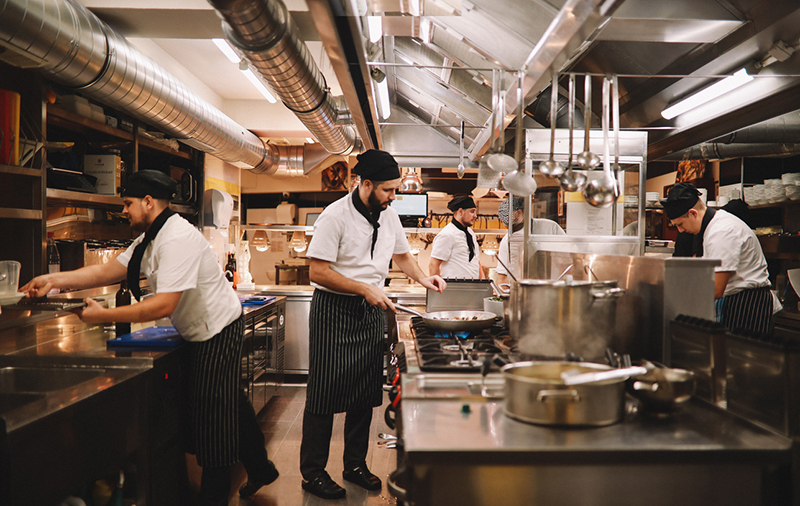
The Michigan Restaurant and Lodging Association today released the results of an early August hospitality industry survey it conducted to better understand the challenges and opportunities facing the industry approximately 1.5 months after COVID-19 restrictions were lifted.
Despite anecdotal stories of industry recovery, the survey data shows the industry still faces significant challenges tied to its workforce, inflationary pressures, and the re-emergence of COVID-19 variants.
“While Michiganians have proven eager to return to a life that includes ample travel and restaurant dining, it has become clear that the nature and speed of this return has placed enormous pressure on the industry and its supply chain,” says Justin Winslow, president and CEO of the MLRA.
“Restaurant and hotel operators are trying to meet consumer demand that exceeds 2019 with 100,000 fewer workers and skyrocketing labor and commodity prices. Workers are exhausted and profit margins are thin for many despite the resurgent demand.”
Part of the labor challenges stem from Gov. Gretchen Whitmer’s veto on July 20 of a House bill that would have ended a $300 weekly federal unemployment benefit. Due to the veto, the federal benefit will continue through Sept. 4.
Paired with Michigan’s top unemployment pay of $362, the $300 federal benefit allows workers to collect a combined $662 a week — or $16.55 an hour for a 40-hour work week.
Survey highlights include:
- 88 percent of hospitality industry respondents are operating with inadequate staffing to meet consumer demand, which includes:
- 100 percent of banquet facilities
- 97 percent of hotels
- 89 percent of full-service restaurants
- 81 percent of quick service restaurants
- 67 percent of bars/nightclubs
- More than four out of five respondents are operating at least 10 percent below adequate staffing levels and a staggering 29 percent in the industry are operating more than 30 percent below what is needed to meet consumer demand.
- Nearly 80 percent of restaurant and hotel operators reported closing early or for specific segments during the day as a direct result of inadequate staffing levels. For full-service restaurants that figure exceeds 85 percent.
- 81 percent of hotels are limiting room inventory because they do not have adequate staffing to turn them over for new guests.
- 95 percent of restaurant and hotel respondents have increased wages in 2021 with half increasing wages by more than 10 percent this year. More than 70 percent have increased schedule flexibility to appeal to prospective employees, while half have offered financial incentives.
- 97 percent reported inflation of commodities this year, with half reporting price increases greater than 10 percent.
- 28 percent support recent CDC guidelines recommending masks indoors because it will “create a safer and more stable environment in which to operate,” while 72 percent opposed because it will “reignite an environment of fear that will negatively impact my business.”
- 73 percent of respondents would oppose a New York City-style mandate requiring proof of COVID-19 vaccination to enter most indoor establishments, including restaurants and hotels.
- 64 percent of respondents believe Congress should enact additional targeted relief for the hospitality industry.
“As we pivot to an uncertain turn of the season fraught with the possibility of persistent COVID-19 challenges, an inadequate workforce, and rampant inflationary pressures, it is important to remember that most restaurants and hotels did not receive federal or state aid during the darkest days of the pandemic,” says Winslow.
“The existential challenges for the hospitality industry are not yet behind it, which is why it is so important for the Michigan legislature and Gov. Whitmer to come together on a deal in September that prioritizes the hospitality industry in yet-to-be-appropriated federal relief dollars. And why Congress should see fit to pass the Save Hotel Jobs Act and secure a second round of funding for the Restaurant Revitalization Fund.”
The survey was conducted between Aug. 3-6 by the MRLA and included 320 responses from Michigan restaurant and hotel operators, representing approximately 1,000 locations statewide. MRLA members and non-members were both presented the opportunity to complete the survey.
Founded in 1921, the MLRA represents more than 5,000 Michigan foodservice and lodging establishments. The industry plays an integral role in Michigan’s economy, employing more than 595,000 people and creating nearly $40 billion in annual sales.
For more information, visit www.mrla.org and www.detroitrla.org.





